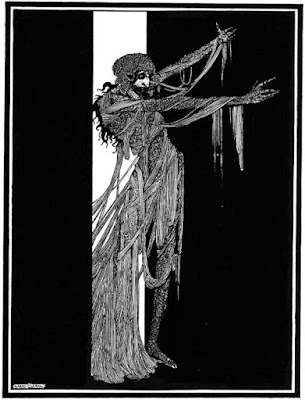The Fall of the House of Usher
Harry Clarke
1919 C.E.
The October 2024 Art In Medicine topic is about Edgar Allen Poe and illness.
Lucinda Bennett, the Medical Librarian at Ascension St Agnes Hospital in Baltimore, MD, publishes a regular series on Art in Medicine and The Health Humanities.
It's only 1-2 pages with gorgeous images, so it won't take you long to read
... and just might enrich your life.
With the arrival of the Halloween season, it is not uncommon to
find the works of Edgar Allan Poe being recited or celebrated
by those who adore the macabre. As one of the most influential
American authors in the class canon, Poe heavily relied on the
fears of the average reader - and himself. Illness and disease,
both of mental and physical nature, factor often in his poems
and short stories. Such topics would later appear vividly
personified in the illustrations which would accompany the
many posthumous printings of his work. Through his writing,
visual artists can creatively depict the morbid visions such as
Lenore or the Raven, but also give insight as to the mental state
of the author himself.
“Edgar Poe was born in Massachusetts, on January 19, 1809, to
parents Elizabeth and David Poe, who were traveling actors … In
1811, Elizabeth Poe passed away from tuberculosis, which she
contracted while pregnant with Edgar; David Poe followed in
death a mere 3 days later. Following the death of their parents,
the Poe children were separated. Edgar was adopted by the
childless John and Frances “Fanny” Allan of Richmond,
Virginia; he was later christened as who we now know as
“Edgar Allan Poe.” Though Frances Allan was known to dote
on Edgar, John Allan was often cold and unaffectionate, resulting in high tensions between him and his adoptive son…Though Poe was inarguably a prolific author, he was known to have suffered from regular bouts of severe depression. … Likely the most traumatizing death for Poe however, was the loss of his beloved cousin and wife Virginia Clemm Poe in 1847. Like his biological mother and older brother, Virginia
succumbed to tuberculosis, a bacterial disease of the lungs that causes its victim to cough up blood and struggle to
breathe.” (Deep Into That Darkness Peering)
In the 19th century, certain illnesses became entwined with popular
culture, with their effects impacting art, literature and even fashion. It comes as no surprise that with such a
personal history of disease and fairly common exposure to other ailments of the era, that Poe would then
incorporate these conditions into his writing. Some of these have become so synonymous with the author that they
form the framework for entire courses of study branching into various disciplines. “Various works by Poe contain
references to epileptic seizures, an example being the short story The Pit and the Pendulum. In other stories, such as
Berenice and The Sphinx, there are also references to episodes that resemble complex partial epileptic seizures.

The Masque of the Red Death
Harry Clarke
1919 C.E.
In
the famous story The Fall of the House of Usher, Roderick Usher and other members of his family suffer from a
hereditary disease that presents as pallor (anemia), hypersensitivity to light and weakness of the extremities together
with behavioral disorders. This very detailed description led authors to the conclusion that Poe was describing 2024
porphyria, which had yet to be described in the literature.” (Poe & Neurology)
Continuing from the observations of
real life suffering and how it contributed to his art, no few
scholars and medical experts have attempted to diagnose the
author based upon surviving records. With the circumstances of
his death still considered a mystery, such endeavors take on the
detective role he once pioneered. “Poe's behavior, with
recurring episodes of depression and behavioral changes,
together with abuse of alcohol and other drugs, such as opium,
laudanum and morphine, could suggest a diagnosis of bipolar
affective disorder with periods of depression and hypomania.
Undoubtedly, the episodes of depression could also have been
triggered by countless environmental factors related to his
family, including disease, death and financial hardship. Reports
that Poe was extremely sensitive to alcohol, with exacerbated
behavioral changes, resulted in a diagnosis of pathological
intoxication being suggested.” (Poe & Neurology)
With such a
plethora of potential conditions the lasting power of Poe is
often attributed to these factors on top of his vivid imagination
and unique style of writing. Aestheticism, a process of thought
which places emphasis on emotional response and setting, was
just coming into fashion during the Romantic Era, the time in
which he lived. “Poe’s theory of literary creation is noted for
two central points: first, a work must create a unity of effect on the reader to be considered successful; second, the production of this single effect should not be left to the hazards of accident or inspiration, but should to the minutest detail of style and subject be the result of rational deliberation on the part of the author.” (Poetry Foundation)
The stories and poems practically illustrate themselves. One fine example of this would be in the work of Harry Clarke. Many readers might recognize his iconic images. The illnesses given humanoid form, like the Red Death, are chillingly accurate to the source material. “He brilliantly captioned the fear and insanity the main characters were going through. Doubtless, you can clearly see the uncertainty the characters experience in the horror scenes. Besides, Harry Clarke created odd and haunting creatures. Creatures with geometrically stylized bodies and unnaturally long slim hands, and with otherworldly, non-human appearances. Therefore, his depictions just added to Poe’s stories.” (Daily Art Magazine)
Reprinted with the generous permission of Ms. Bennett.



.jpg)


.png)


